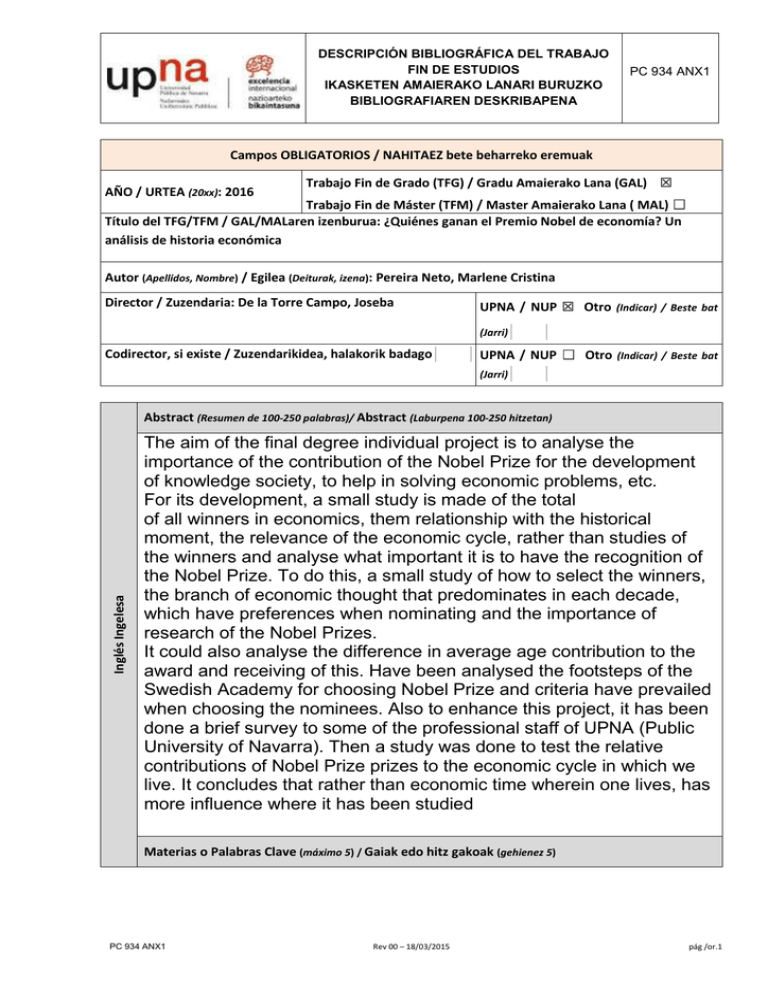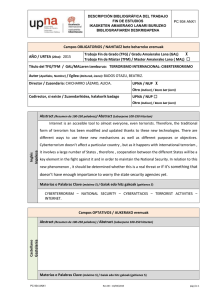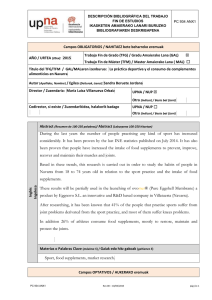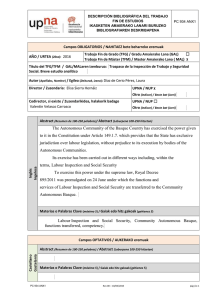Alain Arbeloa Sánchez - Academica-e
Anuncio

DESCRIPCIÓN BIBLIOGRÁFICA DEL TRABAJO FIN DE ESTUDIOS IKASKETEN AMAIERAKO LANARI BURUZKO BIBLIOGRAFIAREN DESKRIBAPENA PC 934 ANX1 Campos OBLIGATORIOS / NAHITAEZ bete beharreko eremuak AÑO / URTEA (20xx): 2016 Trabajo Fin de Grado (TFG) / Gradu Amaierako Lana (GAL) ☒ Trabajo Fin de Máster (TFM) / Master Amaierako Lana ( MAL) ☐ Título del TFG/TFM / GAL/MALaren izenburua: ¿Quiénes ganan el Premio Nobel de economía? Un análisis de historia económica Autor (Apellidos, Nombre) / Egilea (Deiturak, izena): Pereira Neto, Marlene Cristina Director / Zuzendaria: De la Torre Campo, Joseba UPNA / NUP ☒ Otro (Indicar) / Beste bat (Jarri) Codirector, si existe / Zuzendarikidea, halakorik badago UPNA / NUP ☐ Otro (Indicar) / Beste bat (Jarri) Inglés Ingelesa Abstract (Resumen de 100-250 palabras)/ Abstract (Laburpena 100-250 hitzetan) The aim of the final degree individual project is to analyse the importance of the contribution of the Nobel Prize for the development of knowledge society, to help in solving economic problems, etc. For its development, a small study is made of the total of all winners in economics, them relationship with the historical moment, the relevance of the economic cycle, rather than studies of the winners and analyse what important it is to have the recognition of the Nobel Prize. To do this, a small study of how to select the winners, the branch of economic thought that predominates in each decade, which have preferences when nominating and the importance of research of the Nobel Prizes. It could also analyse the difference in average age contribution to the award and receiving of this. Have been analysed the footsteps of the Swedish Academy for choosing Nobel Prize and criteria have prevailed when choosing the nominees. Also to enhance this project, it has been done a brief survey to some of the professional staff of UPNA (Public University of Navarra). Then a study was done to test the relative contributions of Nobel Prize prizes to the economic cycle in which we live. It concludes that rather than economic time wherein one lives, has more influence where it has been studied Materias o Palabras Clave (máximo 5) / Gaiak edo hitz gakoak (gehienez 5) PC 934 ANX1 Rev 00 – 18/03/2015 pág /or.1 DESCRIPCIÓN BIBLIOGRÁFICA DEL TRABAJO FIN DE ESTUDIOS IKASKETEN AMAIERAKO LANARI BURUZKO BIBLIOGRAFIAREN DESKRIBAPENA PC 934 ANX1 NOBEL PRIZE, ANGUS DEATON, UNIVERSITY OF CHICAGO, MACROECONOMICS, MICROECONOMICS, US, GOLDEN AGE, CAPITALISM, SWEDISH ACADEMY Campos OPTATIVOS / AUKERAKO eremuak Otro Idioma Beste hizk. bat Euskera Euskara Castellano Gaztelania Abstract (Resumen de 100-250 palabras) / Abstract (Laburpena 100-250 hitzetan) Materias o Palabras Clave (máximo 5) / Gaiak edo hitz gakoak (gehienez 5) Abstract (Resumen de 100-250 palabras) / / Abstract (Laburpena 100-250 hitzetan) Materias o Palabras Clave (máximo 5) / Gaiak edo hitz gakoak (gehienez 5) Abstract (Resumen de 100-250 palabras) / / Abstract (Laburpena 100-250 hitzetan) Materias o Palabras Clave (máximo 5) / Gaiak edo hitz gakoak (gehienez 5) PC 934 ANX1 Rev 00 – 18/03/2015 pág /or.2


